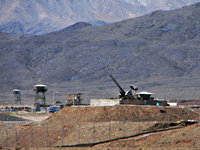Following years of frustrating carrot-and-stick diplomacy, the debate over how to solve the issue of Iran's nuclear program is nearing its end. Neither coercive diplomacy, whether direct or indirect, nor deterrent threats of military attack are likely to prevent Iran from gaining a nuclear weapon. To the contrary, a world in which Iran is a nuclear power is becoming a growing likelihood, one that by pessimistic forecasts may be upon us by 2012-2013.
President Barack Obama's efforts to engage Iran's leadership suggest optimism about the possibility of altering Tehran's behavior peacefully before it crosses the nuclear threshhold. As noted in Obama's speech in Prague, the deadline for diplomacy has not yet passed. Nevertheless, time has in all likelihood run out for any practical solution in which the U.S. wins.
For engagement advocates, the "red line" for when to finally abandon diplomacy and enforce the threat of the military option varies. But the military option, whether threatened by the U.S. or Israel, lacks the political will (U.S.) and the military capability (Israel) to be credible.

